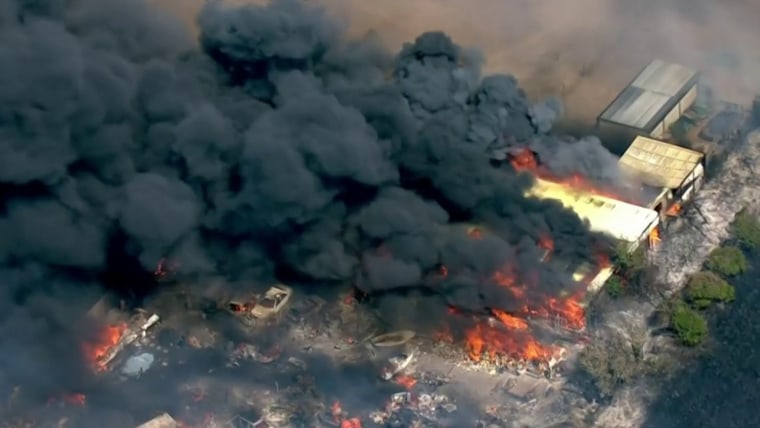More than 100 million Americans were under heat warnings and advisories as of Tuesday morning, with heat indexes predicted to climb to up to 113 degrees Fahrenheit in some parts of Arkansas, Louisiana, Mississippi and Texas on Wednesday.
The United Kingdom, meanwhile, recorded its highest-ever temperature — 104.5 degrees Fahrenheit — on Tuesday, prompting schools to close and train service out of London to cease. France saw similarly high temperatures on Monday.
The highs in some areas of Europe and the U.S. could pass the physical limits of what the human body can handle, according to Kim Knowlton, an assistant clinical professor of environmental health sciences at Columbia University.
“There’s an awful lot of assumption that heat is an inconvenience, but it kills people,” Knowlton said.
In the U.S., heat kills more people annually than any other type of weather event. Over just the last two weeks, Spain and Portugal have collectively reported more than 1,100 heat-related deaths.
“Climate change is fueling these dastardly heat waves that are almost beyond belief, and we’re not accustomed to them yet,” Knowlton said.
How extreme heat kills
A 2017 paper identified 27 different paths through which heat waves can lead to organ failure.
People with the highest risk of dying from extreme heat include the very young, very old, pregnant people and those exposed to extreme heat for long periods of time at work, including people who work in warehouses or on farms.
“The passive exposure, the classic heatstroke, is more [often in] vulnerable populations like children,” said Michael Sawka, a physiologist at Georgia Tech’s School of Biological Sciences.
Cardiovascular issues are the most common cause of heat-related deaths. In extreme heat, the heart starts to pump faster to increase blood flow to the skin, which contributes to cardiovascular strain. The body also starts to sweat more, which can cause it to lose water and decrease the volume of plasma in your blood, making you more prone to blood clots.
Sawka said early signs of cardiovascular distress from extreme heat include dizziness, disorientation or warm, wet skin.
Knowlton said symptoms tend to progress from sunburn to heat rash, followed by heat cramps, fainting, heat exhaustion and eventually heatstroke.
People who experience heatstroke may ultimately stop sweating, she added, because the body can no longer regulate and cool its temperature.
“The body is not able to conduct that excess heat away from the body core, and core temperature starts to rise,” she said. “Once it rises beyond 104 to 105 Fahrenheit, there are a number of physical systems that really start to break down.”
Some people develop heatstroke on the same day as their exposure to extreme heat, while others don’t fall ill until a few days later. Knowlton said recovery is possible, “but there tends to be really long-term — sometimes lifetime — impacts.”
After experiencing heatstroke, she said, “people are much more sensitive to further exposures to heat.”
Knowlton also cautioned people to be careful if they take medications that can impair the body’s ability to respond efficiently to heat, such as antidepressants, diuretics, beta blockers, or migraine or allergy medications.
How hot is too hot?
In evaluating the deadliness of a heat wave, scientists pay close attention to “wet-bulb temperatures” — the combination of heat, humidity, wind speed, sun angle and solar radiation.
A 2020 study found that the human body cannot efficiently cool itself past a wet-bulb temperature of 95 degrees Fahrenheit.
“It’s not a matter of just reaching that temperature for 10 minutes or an hour during the day, but sustained temperatures at that level can really hit the limit of what our human bodies can do,” Knowlton said.
Healthy people who experience heatstroke are usually physically active on days with intolerable wet-bulb temperatures, according to Sawka.
The deadliness of a heat wave also depends on how accustomed one is to high temperatures.
In Ahmedabad, India, temperatures are consistently high, so authorities may not issue a heat alert under temperatures reach 105 degrees Fahrenheit, Knowlton said. But in New York City, she said, temperatures of 95 to 99 degrees Fahrenheit for at least two days are enough to constitute a health warning.
How to stay safe in a heat wave
The simplest ways to reduce the risk of heat-related illness are well known: Drinks lots of fluids, run fans or air conditioning at home if possible, and avoid excess outdoor activity on extremely hot days.
The World Health Organization recommends that room temperatures be kept below 90 degrees Fahrenheit during the day and below 75 degrees at night.
If you’re generally healthy, Sawka said, it may be wise to acclimate yourself to high temperatures for at least 50 to 60 minutes per day when it’s hot outside but not stifling.
“Obviously, if it’s 107, that’s not the day to heat acclimatize,” he said. “But if it’s 85 degrees early in the summer and it’s not as hot, go out and be active a little bit outdoors.”
If you start feeling ill due to the heat, Sawka advised soaking in a bathtub of cold water, making sure the water temperature is much lower than your skin’s or the temperature outdoors. If a cold bath isn’t an option, you can place your forearms in a cooler filled with water and ice, he said.
Unfortunately, pets may have a harder time cooling themselves on extremely hot days. Dogs and cats overheat more easily than humans, since they have fewer sweat glands and rely on panting to lower their body temperature.
But strategies for preventing heatstroke are similar for pets: Give them lots of water; keep them in cool, indoor temperatures (and never inside hot cars); and avoid prolonged outdoor walks or runs when temperatures get too high.
Source: | This article originally belongs to Nbcnews.com










